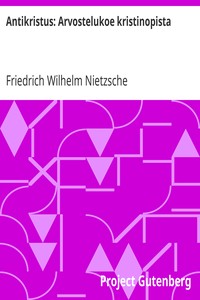| Author |
Nietzsche, Friedrich Wilhelm, 1844-1900 |
| Translator |
Kouta, Aarni, 1884-1924 |
| Title |
Antikristus: Arvostelukoe kristinopista
|
| Note |
Reading ease score: 20.7 (College graduate level). Very difficult to read.
|
| Credits |
Produced by Tapio Riikonen
|
| Summary |
"Antikristus: Arvostelukoe kristinopista" by Friedrich Wilhelm Nietzsche is a philosophical treatise written in the late 19th century. The work serves as a fierce critique of Christianity, exploring the concept of the "higher man" and the detrimental effects of Christian morality on humanity. Nietzsche articulates his views on power, morality, and the decline of spiritual values, aiming to challenge and overturn the prevailing dogmas of his time. The opening of the text sets a confrontational tone as Nietzsche speaks directly to an anticipated audience who he believes will understand his radical ideas. He describes a sense of solitude and strength that comes from his perspective, expressing disdain for the complacency of modernity and the complicity of contemporary moral attitudes, particularly those rooted in Christian teachings. As he articulates his philosophy, he presents the idea that Christianity embodies weakness and a denial of life's natural instincts, arguing instead for a morality that promotes strength, power, and the flourishing of life. Nietzsche's arguments in this opening frame the subsequent discussion that rigorously examines the perceived failures and contradictions within Christian ethics, preparing the reader for a profound philosophical exploration. (This is an automatically generated summary.)
|
| Language |
Finnish |
| LoC Class |
B: Philosophy, Psychology, Religion
|
| Subject |
Christianity -- Controversial literature
|
| Category |
Text |
| EBook-No. |
52953 |
| Release Date |
Sep 1, 2016 |
| Copyright Status |
Public domain in the USA. |
| Downloads |
50 downloads in the last 30 days. |
|
Project Gutenberg eBooks are always free!
|

